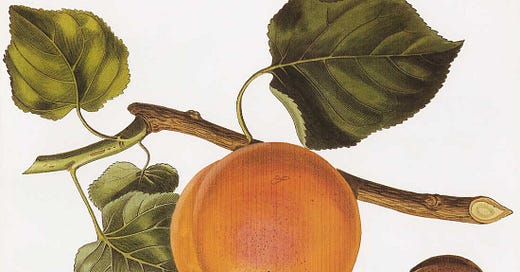Khubani ka Meetha - Some important corrections
New evidence that disproves the original hypothesis about the word
You may wonder what’s the fuss about the word for apricot and why does it require an article carrying the corrigendum. I could indeed, let you dwell upon information that I know realize is incorrect. But that goes against ethics of journalism and reportage and so…
This update came to me from my friend Raamesh Gowri Raghavan, who among many subjects is also a gifted linguist and Persophone. Intrigued by my former article, he took my hypothesis head on with his research and shared information that conclusively proved the origin of the word, Khubani.
The word is Persian in origin insofar that zardaloo is a fresh apricot, khubani is likely a dried apricot (A Comprehensive Persian English Dictionary). While the stated dictionary claims khubani are apricots stuffed with almonds, you will see that the word has evolved to be used for dry apricots in general.
Words such as mishmish or mashmasha too appear in Zand, Persian for Avestan implying ancient origins.
Al-barquq comes from Barquqyo in Aramaic. (Aramaic/Assyrian/Syriac Dictionary & Phrasebook). Incidentally, both Aramaic and Syriac go extinct after the Arab conquest of Iraq/Syria/Jordan/Lebanon (meetings with Raamesh Gowri Raghavan).
Arabic imbibed Aramaic, Assyrian and Persian words and today, these loan words are treated as an extension of Arabic itself. Someday perhaps I will write an article on the conquest of language.
Regarding the sound of the word khubani (ख़ुबानी), the technical word for the pronunciation is unvoiced velar fricative. It’s almost as if the the khu sound becomes hu. However, an unvoiced velar fricative is not native to the Indian subcontinent.
Enter Phonotactics. Phonotactics defines permissible syllable structure, consonant clusters and vowel sequences by means of phonotactic constraints. In simpler terms, a sound not present in a language will mutate to the closest sound in the language. Hence the word khubani, pronounced hubani (ख़ुबानी) becomes khubani (खुबानी).
The Deccan has the alphabet ख in its language and hence. As for the word Qubani, this is merely a different form of expression and has nothing to do with colonial politics and excessive Persianizing of Dakhani.
Acknowledgements:
I would like to thank linguists and Dakhani scholars Dr. Pushkar Sohoni and Abdul Aziz Rajput for clarifying my questions and help refine this article, hopefully taking it to its conclusion. Raamesh Gowri Raghavan remains instrumental in this endeavour and his contributions cannot be sufficiently quantified, suffice to say gratitude is a word that falls short.






Fascinating !